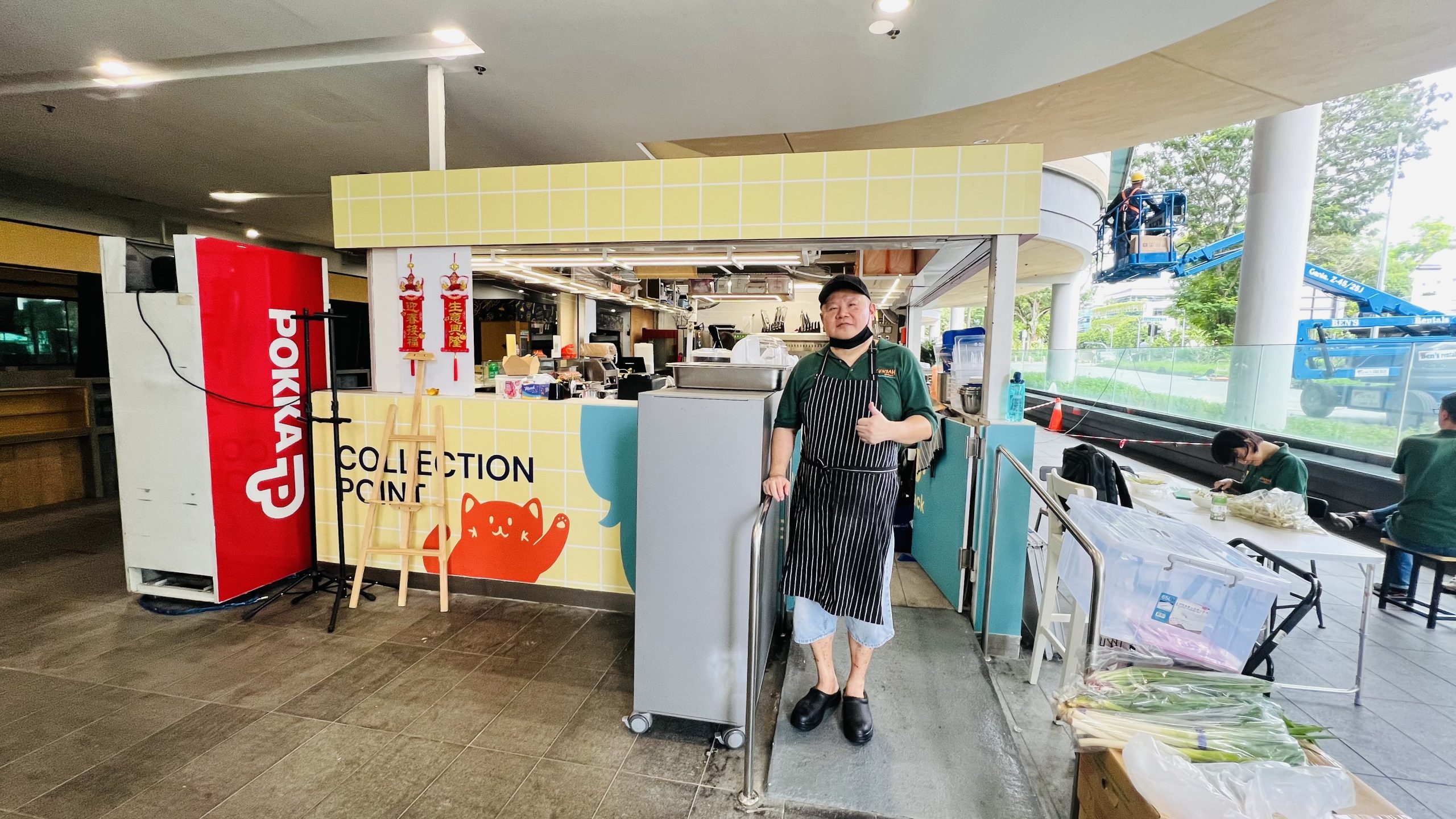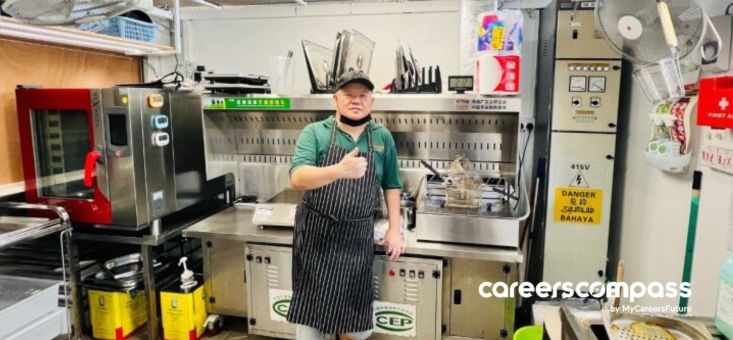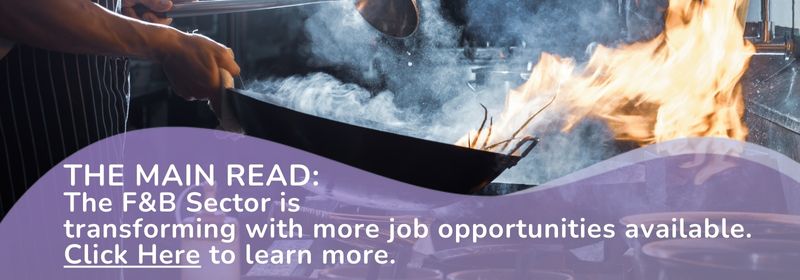It’s common practice for us to offer to send the link of our stories to those featured after the story goes live.
It’s pleasant reading for them, and of course, they’d like to know that their quotes and thoughts are properly communicated to our readers and audience.
But as the writer of this article offered to do the same for the man profiled in this piece, there was a lump in his throat right after he said it. For Alex Seow Teow Eng, his visual impairment means that reading this piece on his phone, mobile device, or laptop seems impossible.
Alex works as a chef at Fortitude Culina, a food kiosk at Singapore Management University (SMU), which is also a social enterprise that provides employment opportunities to persons with visual impairment as chefs.
With almost two decades in the industry as a chef, the 55-year-old would be working as a senior or head chef by this stage of his career, but his life and plans were derailed by a failed eye surgery in 2017 that caused him to lose part of his vision.
Since then, he has managed his condition with care and concern. He shared that he currently has only 25% vision left, compared to 35% after the eye surgery, and everything around him is a blur, except if it’s close-up to his nose bridge.

It has not been an easy path in the past five years managing both his condition and trying to find a way for his career to continue, but Alex has persevered.
“After the operation, I tried to return to the restaurant I was working at to continue as a chef.
“Initially, I could still get by with the help of colleagues and staff, but after some time, they found it simply too impractical and troublesome to keep answering my questions and requests for use.
“Some got frustrated and simply told me to quit instead of slowing down the whole restaurant.
“The restaurant’s boss was actually quite understanding and offered to make me the head chef to quell any dissatisfaction since I would simply be their manager in the kitchen.
“But that didn’t feel right to me – all it would do is breed further unhappiness. So I left in 2019.” Alex shared, adding this led to a period of unemployment after.
Finding a new job was certainly not that easy either- after all, a fast-paced kitchen can be a dangerous workplace, given heated oils and sharp knives are part of the environment.
Workers with disabilities: Singapore employers still value you
Thankfully for Alex, Fortitude Culina provided just the career tonic he needed to get back on track. A startup by entrepreneur Aaron Yeoh, the goal is to try to build a successful business model that also has a social impact, change how people with disabilities are perceived in public, and give them more options for work and advancement.
Working hand-in-hand, Aaron and Alex started the business initially in Jurong, but the Covid-19 pandemic had curtailed future plans to expand into a cafe. But the post-pandemic period brought new opportunities, and Fortitude Culina moved from Jurong to a far more central location at SMU.
The move also presented Aaron with another new opportunity- to build a better and safe work environment for Alex and other chefs and workers with impairments, such as another with cerebral palsy.
He tapped on a job redesign grant from Workforce Singapore’s (WSG) Employment Support for Persons with Disabilities (PWDs) programme. He got a designer to relook how the kitchen workplace could be improved for the café’s workers.
The programme is supported by WSG and SkillsFuture Singapore and administered by SG Enable. It aims to enhance employability, increase employment options for PWDs, and give them access to career advisory services, training courses and post-placement job support.
At WSG, helping Singaporeans from all walks of life be gainfully employed is a key priority. As part of learning about what it means to live with disabilities and understanding the anxieties and challenges, WSG also rolled out several strategic measures to better support persons with disabilities.
For example, tables with adjustable heights are available at WSG’s Careers Connect centres’ self-help areas so that wheelchair users can easily access the computer terminals to use digital services such as career profiling tools and search for jobs through MyCareersFuture.
An eKiosk designed with a height adjustment function is also open around the clock at one of WSG’s centres. In addition, special keyboards with high-contrast colours and extra-large keys have been installed to make typing easier for persons with visual impairment. Career ambassadors are also around during operating hours to provide assistance.
Having a collaborative and creative mindset is a win-win for both employers and employees with disability
Regarding building a disability-friendly kitchen, Aaron revealed: “Our designer interviewed Alex, who did a site visit of our new location and co-designed our kitchen based on our work processes. Alex took the whole redesign seriously and participated proactively to offer his suggestions.”
In the end, three key changes were made:
- Walls were hacked to create more room via an island concept for chefs and staff to move around safely instead of bumping into each other or against partitioned space.
- Customised lights with dimmers were affixed at both workstations and all over the kitchen so that chefs with vision impairments could increase the lighting according to their needs.
- A ramp replaced a kerb entrance to the kitchen, which ensured that visually impaired workers would not trip getting in and out and made it easier to move items from suppliers.
Alex has found these improvements very helpful but added: “At the end of the day, it’s also the culture we have at Fortitude Culina that makes the difference. Ultimately as a cook, I have to rely on my colleagues who can see clearly to perform some of my duties as a chef.”
“While I can still cook and chop with muscle memory from my two decades as a chef – though much more slowly and carefully – I still need colleagues to visually check the dishes to ensure that they’re cooked through.”
“After all, this is the food business we’re in, and food safety and hygiene are always paramount and will always be a priority, even if our chefs and workers are impaired!”
And culture and mindset when it comes to our Singapore workers with disabilities and impairments do matter.
According to a study commissioned by SG Enable, individuals who worked closely with persons with disabilities perceived their company culture and performance significantly more positively than individuals who did not, and employees in disability-inclusive organisations felt that a diverse team was conducive to original and creative thinking and felt a sense of purpose with their employer.
Employers who require support to build up their capabilities and confidence in hiring and integrating persons with disabilities into the workplace can be assured that the journey will not be a lonesome one, and support is available under the Employment Support for Persons with Disabilities programme.
For those with disabilities, WSG is also working with SG Enable to make the MyCareersFuture job portal more friendly for persons with disabilities to navigate and apply for jobs. Employers are also encouraged to post more jobs suitable for them.
In addition, inclusivity at career events is also being explored, such as prioritising venues that are barrier-free and accessible and highlighting jobs that are suitable for persons with disabilities.
For Alex, his career story thus far may have its ups and downs, but it also shows how any difficulty is surmountable with some ingenuity.
Even when it comes to reading this article, it seems. Waving off his visual impairment, he simply told our writer: “Don’t worry, just send me the link! I can always use screen readers and web browsers for the visually impaired that will read what you’ve written out to me.”
Alex is undoubtedly putting living up to the Fortitude Culina name!
















